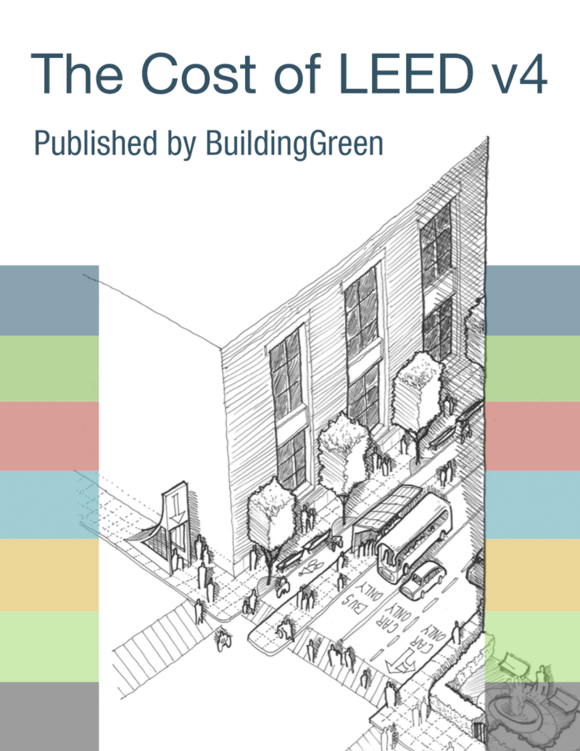- Do not operate permanently-installed air handling equipment during construction unless filtration media with a minimum efficiency reporting value (MERV) of 8, as determined by ASHRAE 52.2–2007, with errata (or equivalent filtration media class of F5 or higher, as defined by CEN Standard EN 779–2002, Particulate Air Filters for General Ventilation, Determination of the Filtration Performance or projects in East Asia may use filtration media classified as medium efficiency (中效过滤器) or higher as defined by Chinese standard GB/T 14295-2008(空气过滤器)), are installed at each return air grille and return or transfer duct inlet opening such that there is no bypass around the filtration media.
LEEDuser’s viewpoint
Frank advice from LEED experts
LEED is changing all the time, and every project is unique. Even seasoned professionals can miss a critical detail and lose a credit or even a prerequisite at the last minute. Our expert advice guides our LEEDuser Premium members and saves you valuable time.
Credit language

© Copyright U.S. Green Building Council, Inc. All rights reserved.
Requirements
Establishment
Have in place a facility maintenance and renovation policy that includes guidelines for renovation and maintenance activities, using LEED rating system strategies, to be implemented at the discretion of building owners, operators, or tenants. Renovation activities include building improvements and tenant fit-outs. Maintenance activities include general repair and replacement. The policy must cover at least those product purchases within the building and site management’s control. The policy must address purchasing, waste management and indoor air quality.Purchasing Policy for Maintenance and Renovations
Have in place a purchasing policy for product and materials purchased for facility maintenance and renovation activities. Include at a minimum:- Base building elements permanently or semi- permanently attached to the building (mechanical, electrical and plumbing components and specialty items such as elevators are excluded). Exclude fixtures, and equipment, which are not considered base building elements;
- Furniture and furnishings as well as components and parts needed to maintain them
- MR Credit: Purchasing—Facility Maintenance and Renovation
Waste Management Policy for Maintenance and Renovations
Have in place a waste management policy addressing the following:- Facility maintenance waste: The policy should address safe storage and recycling and diversion of waste associated with maintenance activities.
- Renovation waste: The policy should describe the procedure for creating an individual plan for each renovation project. Each renovation project should establish waste diversion goals, target five materials for diversion, approximate the volume of waste anticipated, and identify waste diversion strategies to be used.
Indoor Air Quality Policy for Maintenance and Renovations
Have in place an indoor air quality policy for facility maintenance and renovation activities addressing the criteria below. For maintenance activities implement the policy as applicable. For renovation activities create an individual plan for each renovation project as outlined in the policy.- Follow the recommended control measures of the Sheet Metal and Air Conditioning National Contractors Association (SMACNA) IAQ Guidelines for Occupied Buildings under Construction, 2nd edition (2007), ANSI/SMACNA 008–2008, Chapter 3
- Protect stored on-site and installed absorptive materials from moisture damage.
- Do not operate permanently-installed air handling equipment during construction unless filtration media with a minimum efficiency reporting value (MERV) of 8, as determined by ASHRAE 52.2–2007, with errata (or equivalent filtration media class of F5 or higher, as defined by CEN Standard EN 779–2002, Particulate Air Filters for General Ventilation, Determination of the Filtration Performance [East Asia ACP: Construction IAQ Equivalent]), are installed at each return air grille and return or transfer duct inlet opening such that there is no bypass around the filtration media.
- Develop a procedure to, before occupancy, replace all filtration media with the final design filtration media.
- Develop a plan to determine whether a flush-out or air quality testing is needed after construction ends and all interior finishes are installed but before occupancy.
Performance
None.Alternative Compliance Paths (ACPs)
IAQ-MED">East Asia ACP: Construction IAQ Equivalent
Projects in East Asia may use filtration media classified as medium efficiency (中效过滤器) or higher as defined by Chinese standard GB/T 14295-2008(空气过滤器). See all forum discussions about this credit »What does it cost?
Cost estimates for this credit
On each BD+C v4 credit, LEEDuser offers the wisdom of a team of architects, engineers, cost estimators, and LEED experts with hundreds of LEED projects between then. They analyzed the sustainable design strategies associated with each LEED credit, but also to assign actual costs to those strategies.
Our tab contains overall cost guidance, notes on what “soft costs” to expect, and a strategy-by-strategy breakdown of what to consider and what it might cost, in percentage premiums, actual costs, or both.
This information is also available in a full PDF download in The Cost of LEED v4 report.
Learn more about The Cost of LEED v4 »Frequently asked questions
Does the policy need to cover routine facility maintenance activity?The answer to this question is available to LEEDuser premium members. Start a free trial » (If you're already a premium member, log in here.) |
Addenda
- Do not operate permanently-installed air handling equipment during construction unless filtration media with a minimum efficiency reporting value (MERV) of 8, as determined by ASHRAE 52.2–2007, with errata (or equivalent filtration media class of F5 or higher, as defined by CEN Standard EN 779–2002, Particulate Air Filters for General Ventilation, Determination of the Filtration Performance or projects in East Asia may use filtration media classified as medium efficiency (中效过滤器) or higher as defined by Chinese standard GB/T 14295-2008(空气过滤器)), are installed at each return air grille and return or transfer duct inlet opening such that there is no bypass around the filtration media.
Under Campus Approach, delete the last two sentences (Each building must meet the IAQ requirements on its own. Flush-out and air quality testing must be done for each building.).
Documentation toolkit
The motherlode of cheat sheets
LEEDuser’s Documentation Toolkit is loaded with calculators to help assess credit compliance, tracking spreadsheets for materials, sample templates to help guide your narratives and LEED Online submissions, and examples of actual submissions from certified LEED projects for you to check your work against. To get your plaque, start with the right toolkit.
Get the inside scoop
Our editors have written a detailed analysis of nearly every LEED credit, and LEEDuser premium members get full access. We’ll tell you whether the credit is easy to accomplish or better left alone, and we provide insider tips on how to document it successfully.

© Copyright U.S. Green Building Council, Inc. All rights reserved.
Requirements
Establishment
Have in place a facility maintenance and renovation policy that includes guidelines for renovation and maintenance activities, using LEED rating system strategies, to be implemented at the discretion of building owners, operators, or tenants. Renovation activities include building improvements and tenant fit-outs. Maintenance activities include general repair and replacement. The policy must cover at least those product purchases within the building and site management’s control. The policy must address purchasing, waste management and indoor air quality.Purchasing Policy for Maintenance and Renovations
Have in place a purchasing policy for product and materials purchased for facility maintenance and renovation activities. Include at a minimum:- Base building elements permanently or semi- permanently attached to the building (mechanical, electrical and plumbing components and specialty items such as elevators are excluded). Exclude fixtures, and equipment, which are not considered base building elements;
- Furniture and furnishings as well as components and parts needed to maintain them
- MR Credit: Purchasing—Facility Maintenance and Renovation
Waste Management Policy for Maintenance and Renovations
Have in place a waste management policy addressing the following:- Facility maintenance waste: The policy should address safe storage and recycling and diversion of waste associated with maintenance activities.
- Renovation waste: The policy should describe the procedure for creating an individual plan for each renovation project. Each renovation project should establish waste diversion goals, target five materials for diversion, approximate the volume of waste anticipated, and identify waste diversion strategies to be used.
Indoor Air Quality Policy for Maintenance and Renovations
Have in place an indoor air quality policy for facility maintenance and renovation activities addressing the criteria below. For maintenance activities implement the policy as applicable. For renovation activities create an individual plan for each renovation project as outlined in the policy.- Follow the recommended control measures of the Sheet Metal and Air Conditioning National Contractors Association (SMACNA) IAQ Guidelines for Occupied Buildings under Construction, 2nd edition (2007), ANSI/SMACNA 008–2008, Chapter 3
- Protect stored on-site and installed absorptive materials from moisture damage.
- Do not operate permanently-installed air handling equipment during construction unless filtration media with a minimum efficiency reporting value (MERV) of 8, as determined by ASHRAE 52.2–2007, with errata (or equivalent filtration media class of F5 or higher, as defined by CEN Standard EN 779–2002, Particulate Air Filters for General Ventilation, Determination of the Filtration Performance [East Asia ACP: Construction IAQ Equivalent]), are installed at each return air grille and return or transfer duct inlet opening such that there is no bypass around the filtration media.
- Develop a procedure to, before occupancy, replace all filtration media with the final design filtration media.
- Develop a plan to determine whether a flush-out or air quality testing is needed after construction ends and all interior finishes are installed but before occupancy.
Performance
None.Alternative Compliance Paths (ACPs)
IAQ-MED">East Asia ACP: Construction IAQ Equivalent
Projects in East Asia may use filtration media classified as medium efficiency (中效过滤器) or higher as defined by Chinese standard GB/T 14295-2008(空气过滤器).In the end, LEED is all about documentation. LEEDuser’s Documentation Toolkit, for premium members only, saves you time and helps you avoid mistakes with:
- Calculators to help assess credit compliance.
- Tracking spreadsheets for materials purchases.
- Spreadsheets and forms to give to subs and other team members.
- Guidance documents on arcane LEED issues.
- Sample templates to help guide your narratives and LEED Online submissions.
- Examples of actual submissions from certified LEED projects.
Does the policy need to cover routine facility maintenance activity?The answer to this question is available to LEEDuser premium members. Start a free trial » (If you're already a premium member, log in here.) |
- Do not operate permanently-installed air handling equipment during construction unless filtration media with a minimum efficiency reporting value (MERV) of 8, as determined by ASHRAE 52.2–2007, with errata (or equivalent filtration media class of F5 or higher, as defined by CEN Standard EN 779–2002, Particulate Air Filters for General Ventilation, Determination of the Filtration Performance or projects in East Asia may use filtration media classified as medium efficiency (中效过滤器) or higher as defined by Chinese standard GB/T 14295-2008(空气过滤器)), are installed at each return air grille and return or transfer duct inlet opening such that there is no bypass around the filtration media.
Under Campus Approach, delete the last two sentences (Each building must meet the IAQ requirements on its own. Flush-out and air quality testing must be done for each building.).


